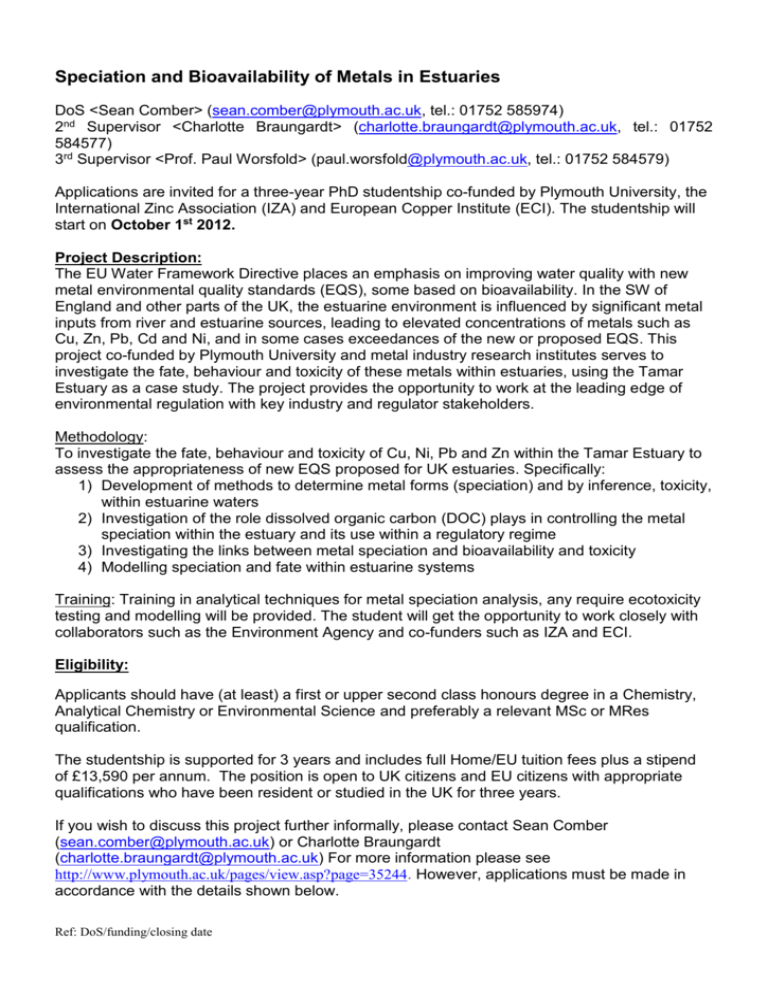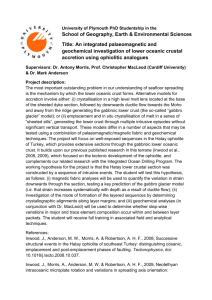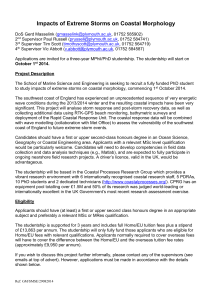NERC Funded Ph
advertisement

Speciation and Bioavailability of Metals in Estuaries DoS <Sean Comber> (sean.comber@plymouth.ac.uk, tel.: 01752 585974) 2nd Supervisor <Charlotte Braungardt> (charlotte.braungardt@plymouth.ac.uk, tel.: 01752 584577) 3rd Supervisor <Prof. Paul Worsfold> (paul.worsfold@plymouth.ac.uk, tel.: 01752 584579) Applications are invited for a three-year PhD studentship co-funded by Plymouth University, the International Zinc Association (IZA) and European Copper Institute (ECI). The studentship will start on October 1st 2012. Project Description: The EU Water Framework Directive places an emphasis on improving water quality with new metal environmental quality standards (EQS), some based on bioavailability. In the SW of England and other parts of the UK, the estuarine environment is influenced by significant metal inputs from river and estuarine sources, leading to elevated concentrations of metals such as Cu, Zn, Pb, Cd and Ni, and in some cases exceedances of the new or proposed EQS. This project co-funded by Plymouth University and metal industry research institutes serves to investigate the fate, behaviour and toxicity of these metals within estuaries, using the Tamar Estuary as a case study. The project provides the opportunity to work at the leading edge of environmental regulation with key industry and regulator stakeholders. Methodology: To investigate the fate, behaviour and toxicity of Cu, Ni, Pb and Zn within the Tamar Estuary to assess the appropriateness of new EQS proposed for UK estuaries. Specifically: 1) Development of methods to determine metal forms (speciation) and by inference, toxicity, within estuarine waters 2) Investigation of the role dissolved organic carbon (DOC) plays in controlling the metal speciation within the estuary and its use within a regulatory regime 3) Investigating the links between metal speciation and bioavailability and toxicity 4) Modelling speciation and fate within estuarine systems Training: Training in analytical techniques for metal speciation analysis, any require ecotoxicity testing and modelling will be provided. The student will get the opportunity to work closely with collaborators such as the Environment Agency and co-funders such as IZA and ECI. Eligibility: Applicants should have (at least) a first or upper second class honours degree in a Chemistry, Analytical Chemistry or Environmental Science and preferably a relevant MSc or MRes qualification. The studentship is supported for 3 years and includes full Home/EU tuition fees plus a stipend of £13,590 per annum. The position is open to UK citizens and EU citizens with appropriate qualifications who have been resident or studied in the UK for three years. If you wish to discuss this project further informally, please contact Sean Comber (sean.comber@plymouth.ac.uk) or Charlotte Braungardt (charlotte.braungardt@plymouth.ac.uk) For more information please see http://www.plymouth.ac.uk/pages/view.asp?page=35244. However, applications must be made in accordance with the details shown below. Ref: DoS/funding/closing date For an application form and full details on how to apply, please visit www.plymouth.ac.uk/postgraduate. Applicants should send a completed application form along with a covering letter detailing their suitability for the studentship, C.V. and references to Catherine Johnson, Faculty of Science and Technology Research Office, Room A425, Portland Square, Plymouth PL4 8AA or e-mail catherine.johnson@plymouth.ac.uk. The closing date for applications is 12 noon on 10th September 2012. Shortlisted candidates will be invited for interview on the week starting the 17th September. We regret that we may not be able to respond to all applications. Ref: DoS/funding/closing date









